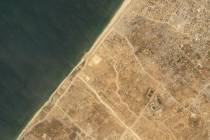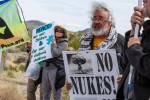DOE: Yucca could be bigger still
WASHINGTON -- Yucca Mountain could hold at least three times more nuclear waste than currently allowed, the Department of Energy said Tuesday in a report that recommends Congress expand the storage site it plans to build in Nevada.
Years before the proposed repository would be built, it would be considered "filled" to a 70,000 metric ton capacity that Congress set in a 1982 law. Rather than initiate a long and politically complex search for a second repository, DOE said, lawmakers should remove the cap and allow the Yucca site to be enlarged.
The 15-page report, which had been ordered by Congress, contained few surprises as Yucca Mountain managers had previewed it in presentations to congressional committees and science boards in recent weeks.
It drew little immediate attention on Capitol Hill. Rep. Shelley Berkley, D-Nev., criticized it, saying DOE was trying to "supersize" the amount of nuclear waste that could be buried in the state.
"I fear the Bush administration has gone delusional in its final throes," Berkley said.
Sen. James Inhofe, R-Okla., a repository supporter, said it made sense to focus on Yucca Mountain rather than reopen a search process that could involve dozens of states. DOE said a new search would probably involve sites in 31 states that were examined before Congress in 1982 narrowed the list to three sites, and then only to Nevada in 1987.
"Opponents of Yucca Mountain regularly state that Yucca Mountain is dead and will never be built," Inhofe said. "President-elect Obama has committed to stop it. My question to them is 'Then what state is going host the repository?' "
Obama has said he supports keeping nuclear waste stored at power plants "until we find a safe, long-term disposal solution that is based on sound science."
In a second report released Tuesday, the department said Congress would need to pass new legislation before DOE could take ownership of nuclear waste now kept at nine decommissioned utility sites in eight states.
The reactors, in Michigan, Connecticut, California, Wisconsin, Maine, Oregon, Massachusetts and Illinois, have been closed. But 2,813 metric tons of waste remain, kept either in dry cask storage or in cooling pools, and state leaders, utility owners and neighboring communities have agitated to get it removed.
As for Yucca Mountain capacity, the Energy Department has said the cap-limited site 100 miles northwest of Las Vegas is nowhere near sufficient to handle the growing stockpile of nuclear waste being generated at power plants, plus high level radioactive waste from defense programs now stored at government sites in Washington, Idaho and South Carolina.
The department has not set a new opening date for the much-delayed repository, with its "best case" scenario expected to stretch beyond 2020. Legislation to enlarge the repository was proposed by DOE in 2006, but did not make progress.
The report does not specify a new capacity for Yucca Mountain. But it notes that various studies have concluded the site could technically triple its storage space at least. One study by the utility-funded Electric Power Research Institute has said that with additional site characterization the repository could be expanded nine times over.
DOE in an environmental impact statement last fall analyzed the effects of building the site to hold 135,000 metric tons, which is expected to be all the waste that will be generated by currently operating nuclear plants if they all run for the maximum allowed 60 years.
Currently more than 58,000 metric tons of waste is stored at commercial plants, while an additional 2,000 metric tons is generated each year. Commercial waste has been allocated 63,000 metric tons of storage at Yucca Mountain, a level that will be reached by 2010, the department said.
In addition there already is more government nuclear waste than will be allowed at the repository, DOE said. There is about 12,800 metric tons of defense waste being processed for storage, already more than the 7,000 metric tons allocated for its storage at the Yucca Mountain.
Contact Washington Bureau Chief Steve Tetreault at stetreault@stephens media.com or 202-783-1760.


















